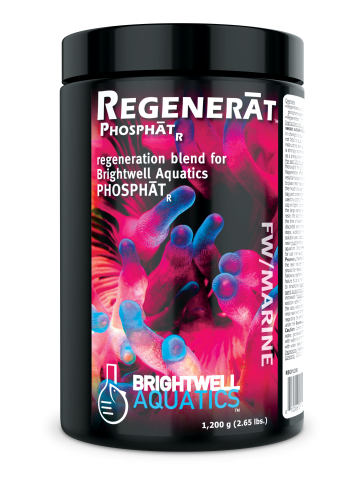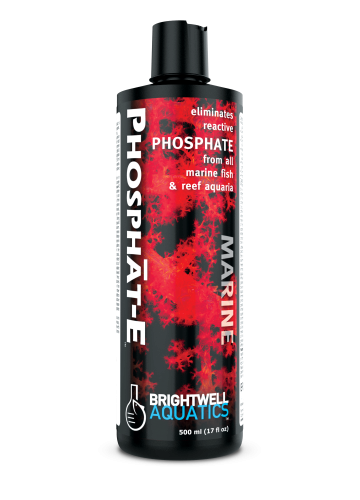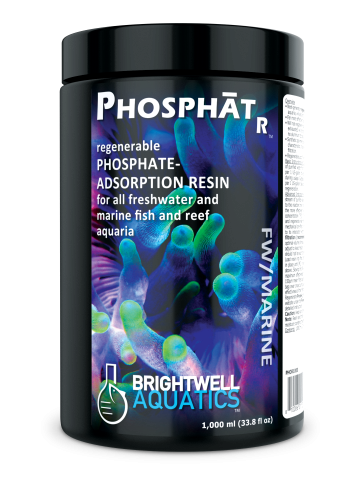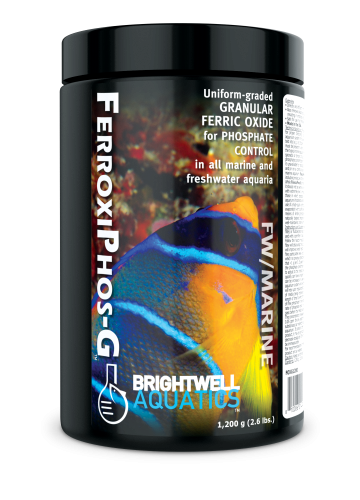ExtraxPhos
Spherical Phosphate-Adsorption Media for Use in All Freshwater & Marine Aquaria
Overview
- Advanced adsorbent of phosphate and silicate; provides rapid results.
- May be used on an on-going basis as part of a sensible nutrient-control program.
- Spherical shape and porosity maximize reactive surface area; promotes reactivity and efficiency by maximizing contact time and minimizing tendency to pack and channel water, and outperforms competing non-spherical phosphate-adsorbent media.
- Recommended usage is 2 g of Extrax Phos per 1 US-gallon (3.8 L) in aquarium; 600 grams will adsorb up to 20 mg/L phosphate in 300 US-gallons (1,136 L).
- Does not release phosphate, silicate, or soluble compounds into aquarium system .
- Safe for use in all freshwater and marine aquaria, including freshwater planted systems and reef systems.
Sizes
- 600 g
- 3,2 kg
- 22 kg
Technical Background
Phosphate, while required in miniscule amounts by living organisms for proper functioning, can indirectly negatively impact the overall appearance of an aquarium system if it is allowed to exist at a concentration measurable by most aquarium test kits (e.g. >0.05 ppm); in order for this impact to occur, other undesirable substances must be present in varying concentrations, however these substances are rarely limiting in the typical marine aquarium. Because of this, elevated phosphate concentrations, whether sporadic or chronic, should be combated. The combined characteristics of shape, porosity, and grade of material enable Extrax Phos to effectively trap phosphate and remove it from aquarium water. This method of treatment may be used as needed and/or on a continual basis to maintain an immeasurable phosphate concentration in a marine aquarium.
While Extrax Phos provides a workable solution to potential phosphate-related problems, it should not be seen as an alternative to proper and sensible aquarium husbandry. Aquaria with extremely-low to immeasurable reactive phosphate often appear more pristine than those in which phosphate is allowed to persist in an elevated concentration. Feeding aquarium inhabitants sensibly, limiting the use of organic-based supplements and additives, use of a high-quality synthetic aquarium salt blend, and performing water changes/replacing evaporation with purified water are all important aspects of phosphate control. Additional means of limiting phosphate are maintaining a culture of macroalgae in the system to naturally deplete phosphate and other substances, and/or the use of an effective and well-maintained protein skimmer.
Instructions and Guidelines
Prior to first use, rinse each 600 grams of Extrax Phos in ½ US-gallon of purified water, then discard water; note that Extrax Phos material may become hot when first immersed in this water. Use 2 grams of Extrax Phos per 1 US-gallon of water in system and monitor phosphate concentration (“[PO43-]”) during usage.
Apply Extrax Phos media as required to obtain and then maintain an immeasurable [PO43-]. It is time to replace Extrax Phos once the [PO43-] in the system either ceases to decrease (e.g. when the [PO43-] is >0.05 mg/L and is no longer falling) or begins to increase; this indicates complete media exhaustion. Slight changes in coloration of the media with usage do not necessarily indicate exhaustion and should not be used as a guideline for when to replace the media.
The longevity of Extrax Phos is largely dependant upon the pre-existing phosphate concentration in the aquarium; the higher the initial concentration, the faster the material exhausts. Effectiveness of Extrax Phos is largely related to the reaction time it has with aquarium water; the longer the reaction time, the more effectively it will remove phosphate and silicate. In all cases, the use of a mechanical pre-filter to remove particulate organic material from water prior to its interaction with this media will inhibit biofouling and prolong effectiveness. Due to the friable nature of the material, use in a fluidized-bed filter is not recommended; instead, placement in a canister filter (active filtration) or 150 μm mesh filter bag (passive filtration) are recommended. If choosing the latter approach, place bag in an area of medium-flow and turn bag over once during usage to shift the media and increase filtration effectiveness.
Caution: Keep out of reach of children. Extrax Phos material may become hot when first immersed in water.



